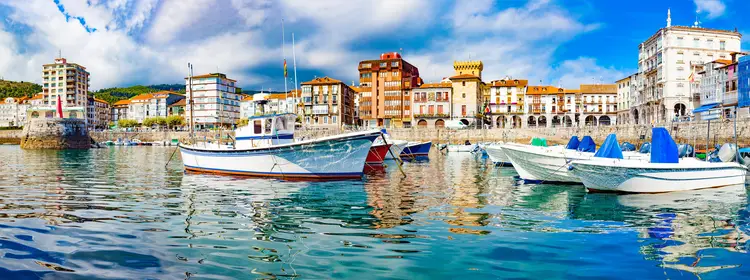
Old World Europe At Latin America Prices
My high-powered, six-speed Opel was stranded… stopped partway through a turn onto a narrow, cobblestoned street, much to the annoyance of the pedestrians surrounding the car and the drivers behind me.
Looking up at the tall stone buildings lining the street just 10 feet apart, it was clear that the thoroughfare my hotel was on was designed for drivers on horseback… a long time ago.
After returning to the expansive, underground parking lot we’d passed a few minutes earlier, we dropped off the car and joined the crowd of pedestrians walking along the centuries-old streets, enjoying the tiny restaurants and bars the town is known for.
This is the medieval Spanish coastal city of Castro Urdiales. Often simply called Castro, it’s an ancient port city on Spain’s rugged north coast.
It’s likely you’ve read volumes about Spain’s overbuilt southern and eastern coasts. By comparison, the north is largely ignored… especially by North Americans.
Castro is built around an old harbor enclosed by a stone seawall… surrounded on the shoreline by a wide, long, pedestrian promenade. A massive stone church overlooks the harbor and the town.
Go Offshore Today
Sign up to our free twice a week dispatch Offshore Living Letter
and immediately receive our FREE research report
on how to live tax-free today, while earning up to $215,200!
Castro was founded by the Romans in the year 74. The church is fairly new by comparison, built in 1208. Being a part of this kind of history is second nature to most Europeans, but it’s mind-boggling to me… someone whose home has always been somewhere in the Americas.
But if I’m honest, I didn’t come for the medieval history… as much as I love the architecture and ambiance.
I came to see the unique lifestyle that the city offers. I think Castro would be a great place to live… or at least a great place to escape the hot Mexican summers that we have in Mazatlán.
Castro has everything I like in a prime expat destination, from its climate to its cost of living.
Specifically, here’s what I like about Castro Urdiales…
The Climate
This part of Spain’s coast is mountainous, lush, and green, with moderate rainfall throughout the year. Here, water is plentiful, with dense forests and flowing rivers. And it never gets as hot (or as cold) as it does in the south.
The Bay of Biscay moderates the temperature all year… so overnight frost is rare at sea level in the winter, and the hottest month of the year (August) only averages a high of 79°F (26°C).
It’s Walkable
Once I got rid of the car in that underground lot, I never needed it again. We were staying just a half-block from the waterfront, and the central farmers’ market and the modern supermarket were both about five minutes away on foot. Dozens of options are available for eating out within that distance—breakfast, lunch, and dinner—from sunrise until the wee hours of the next morning.
What’s more, the wide, sandy beach is just a 10-minute walk along the seawall from the harbor in the historic center.
Go Offshore Today
Sign up to our free twice a week dispatch Offshore Living Letter
and immediately receive our FREE research report
on how to live tax-free today, while earning up to $215,200!
The cost of most things in this part of the country is much less expensive than in the big cities like Madrid, Sevilla, and Granada. Prices here are not much different from what we pay for things in Mazatlán, Mexico.
For example, in Castro, I got the “menú del día” (menu of the day), which is a fixed-price meal consisting of a large first course, a large second course, a dessert, and your choice of wine or water. In Castro, the price was 12 euros. In Madrid, the same meal cost 27 euros.
A small, appetizer-sized portion of croquettes, olives, ham, etc., costs about 1.50 euros. A glass of wine starts at 1.50 euros… while a glass of good, vintage wine starts at 2.50 euros and goes as high as 5 euros in a tourist area.
Even better, it’s not customary to leave a tip in most situations… so Americans can take 20% off virtually everything they buy while dining out, from steaks to a cup of coffee. The omnipresent American tip jar isn’t found here.
Property prices have been on the rise here in recent years but you can still find good deals. In the heart of the town, minutes from the beach, a three-bedroom, two-bathroom apartment with a terrace is on offer for 175,000 euros.
If you’d rather rent, a three-bedroom apartment in a central location with a terrace and sea views is available for 850 euros a month. Smaller units can be found for as little as 600 euros a month.
I find that here in Castro I spend about the same as I’d spend in many upscale Latin American locations.
But there’s a catch…
If you should manage to become a tax resident of Spain—by residing there more than 183 days per year—you’ll likely find yourself paying higher taxes than you would in most U.S. states. You can minimize the burden by properly structuring your holdings in Spain and abroad, with the help of a good Spanish tax professional.
If you’re interested in an Old World, European lifestyle in a medieval setting—at a fraction of what you’d expect to spend—then Castro Urdiales is definitely a destination you should investigate further.
Sincerely,
Lee Harrison
Contributor, Offshore Living Letter



